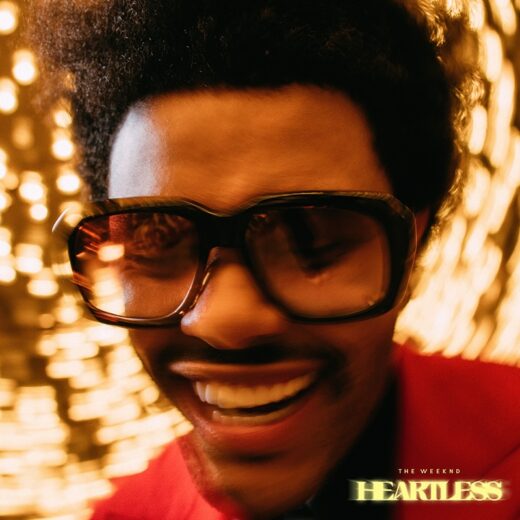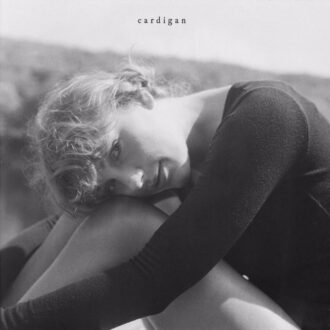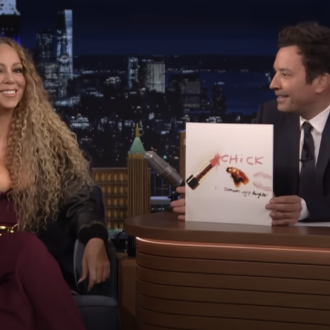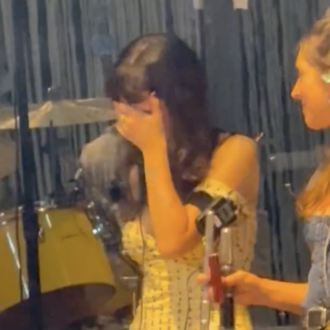In The Number Ones, I’m reviewing every single #1 single in the history of the Billboard Hot 100, starting with the chart’s beginning, in 1958, and working my way up into the present. Book Bonus Beat: The Number Ones: Twenty Chart-Topping Hits That Reveal the History of Pop Music.
“Where the fuck’s the black light? Naw, I asked for black light. I’m not performing until there’s fuckin’ black light on this fuckin’ stage.” The Weeknd is not performing until there’s fuckin’ black light on this fuckin’ stage. It’s 2012, and the Weeknd is at a New York club, not doing a standard show but presumably getting paid a pile of money to sing a couple of songs. By way of introduction, the DJ just tells someone to hand him the mic, and he uses that mic to demand fuckin’ black light. The black light finally comes on, and the vibe feels right. The Weeknd’s urban camo glows. The stage is really just a pit in the floor, but that’s all he needs to sing his mixtape track “The Morning.” He’s early in his blog-driven ascent, and even though his audience can finally see his once-hidden face, he still carries an aura of mystery.
Adam Sandler doesn’t care. He’s here to find LaKeith Stanfield and to get back the opal that he lent to NBA great Kevin Garnett. He just heard of the Weeknd for the first time today, from his mistress Julia Fox, who is doing plenty of glowing of her own against the wall. He only glances over when the Weeknd starts singing, and then he gets back to the chaotic, stressful adventure of his day-to-day life. Trinidad James is there, and he and Sandler briefly say hi. But Stanfield doesn’t have what the Sandman needs, so Sandler starts screaming and shoving before realizing that he’s about to get his ass beat and quieting down. He glares impotently from the side of the room, and the Weeknd’s music does not soothe his soul. (Adam Sandler’s only Hot 100 hit, 1996’s “The Chanukah Song,” peaked at #80. Trinidad James’ only Hot 100 hit, 2012’s “All Gold Everything,” peaked at #36.)
Cut to a bathroom stall in the VIP section, where the Weeknd and Julia Fox sniff coke together. He tells her that he wants to fuck her so bad, and she insists on no touching, but she seems pretty happy at all the attention. Adam Sandler comes banging on the door before she can change her mind, and he and the Weeknd grab each other and roll around on the floor for a second before security mauls Sandler. Everyone screams at everyone else. Outside the club, Sandler yells at a bouncer some more, vowing revenge against the Weeknd: “Not one fuckin’ DJ’s gonna play his shit! I know every fuckin’ DJ in this town!” The Weeknd doesn’t return to the story after that. The rest of his tale is the one that we already know, just from paying attention to pop music these past 13 years.
What we’re seeing is the cinematic debut of Abel Tesfaye, better known as the Weeknd. The Weeknd loves movies. He wants to make movies himself. He’s one of many stunt-casting coups in the Safdie Brothers’ Uncut Gems, a genuine masterpiece of frantic, visceral 21st-century cinema. In the film, the Weeknd plays his own 2012 self. He wears a wig that recreates the piled-up dreads that he wore in his mixtape days, and he acts out at least one of the scenarios that he habitually describes in his music. He’s not in Uncut Gems for long, but his appearance makes an impression. A24 puts him in the movie trailer, and he begins a film and television career that’s based in the squalid-glamorous aesthetic of Uncut Gems but that’s pretty much entirely bullshit beyond this one moment.
I’d left New York by the time the Weeknd started his ascent, but the milieu of that Uncut Gems scene is dead-on. When the Weeknd gave his first New York performances, it probably did look a lot like that, except with more dorky music critics standing around and housing Yuenglings in the background. (The dorky music critics might’ve also been sniffing coke in the bathroom, but not the VIP one.) When Uncut Gems opens in theaters, the Weeknd is at a different place in his life. He’s playing arenas, not doing sketchy club hosting gigs. He no longer has to ask for the black light; the technicians know when they need to turn it on. At this moment, the opening night of Uncut Gems, the Weeknd has the #1 song in America. But the crazy thing is that he’s still singing about the same debauchery over the same moody, rumbling instrumentals. It’s not hard to imagine him singing “Heartless” instead of “The Morning” in his Uncut Gems scene.
To this point, the Weeknd’s cinematic experiments beyond Uncut Gems have been catastrophic — an HBO show that nobody liked, a theatrical film that nobody saw. But his heart was in the right place. He was canny enough to take that slightly cartoonish, generally unflattering Uncut Gems role in the first place. Presumably because of his experience on the movie, the Weeknd became close with queasy-synth wizard Oneohtrix Point Never, who scored Uncut Gems and has been one of his main collaborators since then. When Uncut Gems came out, the Weeknd was just starting the rollout for After Hours, a blockbuster album named after a similarly unhinged Martin Scorsese masterwork. As the film arrived, so did two new Weeknd singles — one gleaming ’80s-pastiche dance-pop jam, one icy trap dirge. The gleaming ’80s-pastiche dance-pop jam went on to achieve chart immortality, but the icy trap dirge reached #1 first.
After “Starboy,” the Weeknd went a couple of years without a #1 hit — not because his music fell short of mass popularity but because he just didn’t put that much out. He had big plans to follow up his Starboy album quickly with something more upbeat, but those plans changed. The Weeknd’s relationship with former Number Ones artist Selena Gomez fell apart, and he didn’t want to head out and sing happy music every night, so he scrapped the in-progress record. Instead, he released a 2018 EP with the on-the-nose title My Dear Melancholy. “Call Out My Name,” a tortured torch song that he co-wrote with Frank Dukes and Nicolas Jaar, reached #4. (It’s a 6.) That same year, he also got together with Kendrick Lamar, someone who’s been in this column a few times and will be back, for “Pray For Me,” a single from Kendrick’s Black Panther soundtrack. (That one peaked at #7. It’s a 7.)
In addition to My Dear Melancholy and “Pray For Me,” the Weeknd remained plenty busy by guesting on other people’s tracks in the time after Starboy — Nav, Lana Del Rey, Travis Scott, Gesaffelstein, plenty of others. You could hear echoes of his wounded, moody, architectural music in the more synthetically somber songs that were all over the Hot 100 in those years. Even though he remained present, the Weeknd knew how to build anticipation and how to make his proper albums feel like events, and After Hours is probably his greatest triumph in that regard. The After Hours rollout was silly in an extremely film-bro way — the Weeknd pushing his face-bandaged, black-gloved character through a series of increasingly outlandish videos and stunt performances. But he had the songs to make it work.
In November 2019, the Weeknd appeared in a Mercedes ad soundtracked by an extremely sleek new song that we’ll eventually discuss in this column. I usually play coy to avoid spoilers, but that seems stupid in this case. It was “Blinding Lights.” The song was “Blinding Lights,” and “Blinding Lights” will be in this column pretty soon. Duh. But before he actually released the song so effectively teased in that commercial, the Weeknd put another track out into the world — one that was sonically more in line with the dark, throbbing mixtape moment immortalized in Uncut Gems. A couple of days after that Mercedes commercial and a couple of days before the proper release of “Blinding Lights,” “Heartless” made its way to the internet.
“Heartless” is the Weeknd doing his Weeknd thing, and you probably won’t be that into it if you’re not that into the Weeknd thing. When “Heartless” came out, plenty of people were quick to point out that it had the same title as a Kanye West hit. Kanye’s “Heartless,” which came out in 2008 and reached #2, has a similar sensibility — Auto-Tuned moans, glossy but tortured keyboard sounds, bass tones programmed to vibrate your ribcage. (Kanye’s “Heartless” is a 9.) The similarity may have been intentional. Kanye West was a Weeknd collaborator, and his influence, especially the influence of the 808s & Heartbreak album, is all over the Weeknd’s music. But there’s a clear difference in perspective. Kanye’s “Heartless” is a long complaint; it’s him accusing an ex of being heartless. On his own “Heartless,” the Weeknd proudly claims the titular adjective for himself.
The opening lines of the Weeknd’s “Heartless” are a neat little summation of the artist’s gleeful contradictions: “Never need a bitch, I’m what a bitch need/ Tryna find the one that can fix me.” He needs women, but he doesn’t need women. He knows there’s a gaping hole at the center of his soul. He enjoys his own nihilism. He trumpets it. He throws around misogynistic language like it’s nothing, and he insists that women want his commitment but that they will be disappointed. At the same time, he claims that he’s still on the lookout for the woman that will “fix” him, as if that’s something that another person can just do for you. That dichotomy has always been central to the Weeknd’s music, and plenty of people are sick of hearing about it. When “Heartless” reached #1, my friend and colleague Chris Molanphy wrote a column about how the Weeknd’s myopic fixation on this character turned him into the new AC/DC, a commercial force who plays to his base by saying the same thing and making the same song over and over. It’s a fair criticism. Everything that the Weeknd says on “Heartless” is something we’d already heard from him many times.
I like it, though. I like the tension between the Weeknd’s contradictory impulses. I like how he goes deep into self-destruction but always maintains a thread of vulnerability, as if he’s scared but fascinated by his own capacity for degradation. I like the way his music mirrors the sensory overwhelm that you might feel when you’re high as fuck in an expensive nightclub. I especially like the way his voice leaps into his upper register on the chorus, implying a lost-little-kid terror that his lyrics only gesture toward. In the grand history of Black American music, the falsetto vocal has conveyed both childlike softness and swaggering masculinity. For the Weeknd, it does both.
On paper, the Weeknd’s “Heartless” lyrics don’t look like much. He tells us again and again how much pussy he gets — so much he needs a dogpound, so much that it’s falling out of his pockets. (If you take him literally, those are some vivid and nightmarish images.) He’s got a duffle bag full of drugs and guns, a schedule full of magazine photoshoots, and a shooter who never misses, even when he’s drunk. (That’s Stix, a mysterious real-life Toronto street figure who gets shoutouts on a few Weeknd songs and whose role in the XO camp has never been officially defined.) But even as he flexes on us, the Weeknd wants to know that he’s tearing himself up inside. He doesn’t do well alone. A woman has just reappeared in his life, and she never gave up on him, but he doesn’t know why she bothers. He’s trying to be a better man, but he’s heartless. There’s a decent chance that you’ve heard someone talk like this in your life before, and there’s a decent chance that this person wasn’t trying that hard to be better. You probably don’t want to let someone like that into your life, but that dirtbag character can make for some compelling music.
The Weeknd has great taste in collaborators, and the main one on “Heartless” is Metro Boomin, the St. Louis-born rap producer who has already been in this column for working on the Migos’ “Bad And Boujee” and will eventually be in here as a lead artist. Metro and the Weeknd were well acquainted before “Heartless.” Metro came up as a key producer for Future, an artist who will eventually appear in this column. In 2015, Metro co-produced Future and the Weeknd’s “Low Life,” a great song that landed in the exact space where the two artists’ aesthetics overlapped. (“Low Life” peaked at #18, and the Weeknd called back to the track with his “Heartless” lyrics about how he’s a lowlife for life because he’s heartless.) In 2016, the Weeknd appeared on the aforementioned Kanye West’s “FML,” and Metro was among that song’s army of producers. Metro also co-produced “Six Feet Under,” a deep cut from the Weeknd’s Starboy album. (“FML” peaked at #84, “Six Feet Under” at #34.) The Weeknd and Metro Boomin worked together plenty of times since “Heartless,” too. Metro’s version of Atlanta trap is catchy and pop-friendly, and it’s also a vast, cinematic churn. He and the Weeknd make for a natural pairing.
On “Heartless,” the Weeknd demands that Metro Boomin turn this ho into a moshpit, and I understand it. Sometimes, you need someone to turn this ho into a moshpit. If Metro Boomin is around, he is well-qualified to honor that request, though the moshpit in question will be the type of non-scary one that you see in Rolling Loud festival footage. Metro Boomin rarely works as sole producer, and he’s got a couple of collaborators on “Heartless.” One of them is Carlo “Illangelo” Montagnese, the longtime Weeknd producer who’s been involved since the mixtape days and has been in this column for working on “The Hills.” The other is Andre Proctor, known professionally as Dre Moon, who co-wrote “Heartless” and did some additional production. Dre Moon is from the DC suburb of Brandywine, Maryland, and he has a bunch of credits as a producer and songwriter for people like Future and T-Pain. He’s probably still best-known as one of the producers and co-writers of Beyoncé and Jay-Z’s “Drunk In Love,” a #2 hit in 2014. (It’s a 9.)
We don’t really know who did what on “Heartless,” but it comes out sounding like a Weeknd track. It opens with gurgling, smothered faraway keyboard sounds, and then the drums kick in and bring everything into focus. The production is vast and layered. We hear sirens in the distance, seagull caws, laser bleeps, reverb-drenched synth riffs that refuse to resolve. Even the Weeknd’s voice is slathered in effects, made to sound like it’s coming from a loud nightclub speaker heard through a wall. The only parts of the song that cut through cleanly are Metro’s kickdrums and handclaps. They’re the focus of the mix. I really like this kind of production. It doesn’t always work, but when you’re driving late at night and listening loud, it can make you feel like you’re living in a movie. That production is no substitute for a strong hook, but “Heartless” has one of those, too. When the Weeknd’s voice shifts skyward on the chorus and bleats out the title a bunch of times, that sticks with me. It’s not his catchiest song, but it has real muscle in its melody.
For the “Heartless” video, the Weeknd went for something cinematic. Director Anton Tammi — the name looks like a Weeknd alter-ego, but it’s not — shot the Weeknd and Metro Boomin in Las Vegas, on Fremont Street and ambling through some of the city’s more established casinos. In the opening scene, the Weeknd is under the glittering awning of the Plaza, best known to me as Biff’s casino from the second Back To The Future. He’s in a red suit jacket and some huge sunglasses, and he strikes cool-guy poses for a few short seconds before he stares up at the lights and a crazy grin crosses his face. Immediately, the story here is clear: This guy is high as fuck. The rest of the clip plays out as a Fear And Loathing homage, with the Weeknd and Metro staggering around and making cartoonishly exaggerated faces. (Metro is the rare beatmaker who has enough rock-star charisma to pull off the Benicio Del Toro sidekick role.) At one point, the Weeknd licks a toad and then hallucinates his hand turning into the toad. It’s all pretty silly, but it works because Vegas itself is such a hallucinatory effect. When you’re there, you can’t believe it’s real. Watching the clip, I keep thinking about how much it must’ve cost. Those casinos are not letting anyone shoot for free.
The first time that the Weeknd performed “Heartless” was on Colbert, and he kept going with that theme. In the performance clip, Stephen Colbert introduces the Weeknd and then walks off as the camera drifts backstage. The Weeknd, in the same outfit from the video, is back there with a drink in his hand, uncertain of how to find the stage. He wanders through the studio hallways, singing the song while lights flash dramatically all around him. Eventually we see that he’s not in a real hallway. He’s in a revolving set built downstairs from the Colbert studio, and he doesn’t make it to the actual Ed Sullivan Theater until the song is over. As goofy stunts go, it’s pretty fun.
The “Heartless” single came out mid-week on the day before Thanksgiving 2019, and it debuted at #32. A week later, the song rocketed up to #1. A week after that, it fell all the way down to #17, partly because a splashy single like that is practically built to disappear from the charts immediately but mostly because the Hot 100 was flooded with the Christmas songs that we’ll deal with in next week’s column. “Heartless” is not remembered as one of the classic Weeknd songs today. It was almost immediately overshadowed by “Blinding Lights,” which came out right afterward. Today, “Heartless” has north of a billion streams — a big number, but less than a quarter of what “Blinding Lights” has amassed. The “Heartless” single is now triple platinum, which means it’s less successful than Kanye West’s “Heartless” or Diplo and Morgan Wallen’s “Heartless.” (The Diplo/Morgan Wallen “Heartless,” which also came out in 2019, peaked at #39. Wallen will appear in this column a bunch of times.)
But I don’t think the Weeknd’s “Heartless” is a true case of a song that shoots straight to #1 and then vanishes. On the Hot 100, “Heartless” briefly bounced back to #4 when the After Hours album came out. The Weeknd still performs “Heartless” on his current stadium tour. Not long ago, I heard the song over the speakers in Kroger. It was a little surprising, since there are plenty of Weeknd songs more suited to the supermarket experience than “Heartless,” “Blinding Lights” chief among them. “Heartless” begs to be heard on a massive soundsystem when you’re deeply faded, feeling like you’re in that one scene from Uncut Gems. That’s the opposite of how I’m feeling when I’m trying to see if they’ve got the Jayson Tatum flamin’ hot BBQ chips back in stock. (They never have those fucking things, but I keep looking. They only ever have the flamin’ hot cheddar and sour cream, and who wants that?) Even in that supermarket moment, though, “Heartless” still hit. If Kroger had a black light, I would’ve yelled for someone to turn it on.
GRADE: 7/10
BONUS BEATS: Here’s the Weeknd and former Number Ones artist Lil Uzi Vert’s pitched-down “vaporwave” remix of “Heartless,” which the Weeknd included on a 2020 deluxe edition of After Hours:
The Number Ones: Twenty Chart-Topping Hits That Reveal The History Of Pop Music is out now via Hachette Books. I’m sellin’ books to these girls with they guard down; buy one here.




